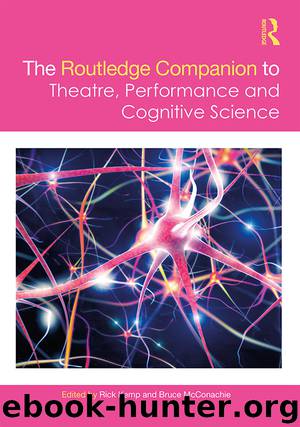The Routledge Companion to Theatre, Performance and Cognitive Science by Rick Kemp Bruce McConachie

Author:Rick Kemp,Bruce McConachie
Language: eng
Format: epub
Publisher: Taylor & Francis (CAM)
Published: 2019-02-26T16:00:00+00:00
16 Acting Technique, Jacques Lecoq and Embodied Meaning
Rick Kemp
Introduction
The idea that actors employ technique can be surprising to many outside the fields of theatre and performance. While the visibility of technique varies according to style and medium, in the naturalistic style of most Western drama, actors seem to appear to respond spontaneously to events, creating an apparent naturalness of behaviour in fictional circumstances. In fact, this naturalness is generally the result of many years of training, and long and painstaking preparation for individual roles. Actors preparing and playing a role engage in most, if not all, of the cognitive processes that humans conduct in daily life – with a crucial difference. Actors consciously elicit and regulate phenomena that generally arise spontaneously for most people. It is probably easy to recognise that an actor will seek to consciously regulate features such as vocalisation, facial expression, gesture and movement, because these are audible and visible. But actors also address many other phenomena that are not so readily apparent. Imagination is necessary to embody a fictional character in fictional circumstances. Empathy with the fictional character may be stirred by this process, and the actor certainly seeks to stimulate empathy in an audience. Actors also seek to stimulate and regulate emotion – the believability of emotion in fictional circumstances is highly valued by Western audiences.
A heightened faculty of memory is necessary not only for the obvious task of precisely memorising dialogue, but also for less evident tasks, such as reproducing the planned movement and behaviour in a specific production, often at the micro-level of ‘actions’ that communicate unspoken thoughts and feelings. In preparing a role by analysing a script or through improvisatory creation, an actor needs a knowledge of linguistic and narrative forms, as well as a psychological and sociological understanding of human behaviour. This list is not exclusive, but it gives an idea of the realm of extended cognitive-affective activities within which an actor’s technique operates. Some of the activities are conscious, many operate below the level of conscious awareness most of the time and many can never be consciously accessed. So actors are frequently seeking to consciously elicit otherwise unconscious phenomena. The means by which they do this are the assorted exercises and practices that I collectively call technique. It is these activities that are taught in actor training.
In Western theatre, actor training as a dedicated activity arose predominantly in the twentieth century, with varied forms of apprentice systems largely responsible for the development of technique prior to this. The most influential formulator of contemporary acting technique in the West was Russian actor and director Konstantin Stanislavski (1863–1938), who developed a system for preparing a role that is widely taught in European, North American and Western-influenced theatre conservatoires. His work is analysed from a cognitive perspective by Sharon Carnicke in Chapter 1 of this book. Stanislavski’s approach is largely applied to text-based performance and associated mainly with the style of psychological realism that has been prevalent on stage and screen in the second half of the twentieth century and early part of this century.
Download
This site does not store any files on its server. We only index and link to content provided by other sites. Please contact the content providers to delete copyright contents if any and email us, we'll remove relevant links or contents immediately.
| Acting & Auditioning | Broadway & Musicals |
| Circus | Direction & Production |
| History & Criticism | Miming |
| Playwriting | Puppets & Puppetry |
| Stage Lighting | Stagecraft |
Call Me by Your Name by André Aciman(20499)
Ready Player One by Cline Ernest(14644)
How to Be a Bawse: A Guide to Conquering Life by Lilly Singh(7472)
Wiseguy by Nicholas Pileggi(5770)
The Kite Runner by Khaled Hosseini(5170)
On Writing A Memoir of the Craft by Stephen King(4935)
Audition by Ryu Murakami(4923)
The Crown by Robert Lacey(4807)
Call me by your name by Andre Aciman(4676)
Gerald's Game by Stephen King(4641)
Harry Potter and the Cursed Child: The Journey by Harry Potter Theatrical Productions(4494)
Dialogue by Robert McKee(4389)
The Perils of Being Moderately Famous by Soha Ali Khan(4216)
Dynamic Alignment Through Imagery by Eric Franklin(4208)
Apollo 8 by Jeffrey Kluger(3702)
The Inner Game of Tennis by W. Timothy Gallwey(3679)
Seriously... I'm Kidding by Ellen DeGeneres(3628)
How to be Champion: My Autobiography by Sarah Millican(3590)
Darker by E L James(3512)
